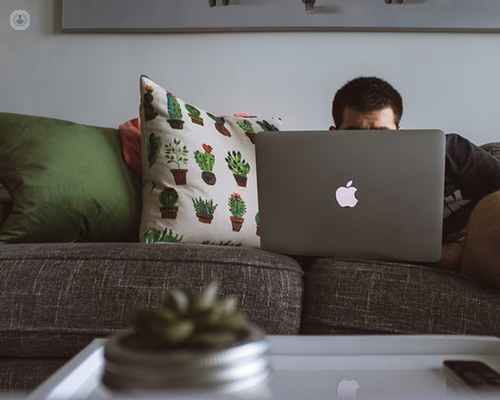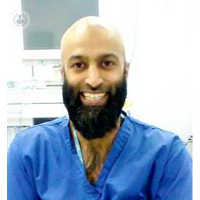How to prevent shoulder pain when working from home
Written by:Are your shoulders aching more since you've been working from home (WFH) during the COVID-19 pandemic? If you are not careful, sitting in the wrong position can cause muscle pain, especially if you spend hours slouched on the sofa instead of upright in an office chair! We spoke to one of our orthopaedic surgeons Mr Ziali Sivardeen what possible shoulder injuries may occur and how they can be prevented.

What are common shoulder injuries that might be a result of WFH?
Shoulder injuries and pain are common in people who work at home. The abnormal posture when someone crouches over a laptop for several hours each day can lead to tendonitis, bursitis and impingement of the shoulder. The altered mechanics around the shoulder, which result from this abnormal posture, can lead to injuries when people play sport or train in the gym.
Why is it important to get shoulder pain looked at as early as possible?
Any shoulder pain is worth getting looked at soon before something simple to deal with develops into something a lot harder, which may need surgery. Most problems require physiotherapy.
Is it difficult to treat shoulder pain at the moment during the pandemic?
Although there is a pandemic, people can be assessed easily by a specialist via video consultation. Scans can be organised, treatment can be started and even surgery can be organised if required. Shoulder pain can be managed at home with simple pain relief but most problems need simple physiotherapy exercises.
How can shoulder pain be prevented when working from home?
It may be tempting to sit on the sofa whilst you WFH but it’s important to avoid sitting in a sedentary environment and to be aware of your posture. Take regular mini-breaks, stretch and shake out your arms and hands. If it is possible, try to go for 10-minute walks every couple of hours throughout the day.
Where possible, adjust your working space and try to ensure that your desk is level with your elbows when you are seated. Your computer monitor should be kept at arm's length. Try to keep things that you regularly need within easy reach to avoid regularly twisting or stretching to pick them up.
If you would like to see Mr Sivardeen about your shoulder pain, you can book an appointment to see him via his Top Doctor's profile here.


